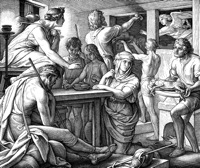Difference between revisions of "Passover"
(Redirected page to Passover) |
|||
| Line 1: | Line 1: | ||
| − | # | + | [[File:lighterstill.jpg]][[File:Passover_2.jpg|right|frame]] |
| + | |||
| + | ==Origin== | ||
| + | from the exemption of the [[Israel]]ites from the slaughter of the firstborn in Egypt ([[http://nordan.daynal.org/wiki/index.php?title=Book_of_Exodus#Chapter_.12 Exodus 12:23–27]) | ||
| + | ==Definition== | ||
| + | *a [[Jewish]] holiday beginning on the 14th of [http://en.wikipedia.org/wiki/Nisan Nisan] and commemorating the [[Hebrews]]' [[liberation]] from [[slavery]] in [http://en.wikipedia.org/wiki/Ancient_Egypt Egypt] | ||
| + | ==Description== | ||
| + | '''Passover''' ([[Hebrew]], Yiddish: פֶּסַח Pesach, Tiberian: [pesaħ] ( listen), Modern Hebrew: Pesah, Pesakh, Yiddish: Peysekh, Paysakh, Paysokh) is a predominantly Jewish holy day and festival. It commemorates the [[story]] of the Exodus, in which the [http://en.wikipedia.org/wiki/Ancient_Israelites ancient Israelites] were freed from [[slavery]] in Egypt. Passover begins on the 15th day of the month of Nisan, which is spring in the Northern Hemisphere, and is celebrated for seven or eight days. It is one of the most widely observed Jewish holidays. | ||
| + | |||
| + | In the [[narrative]] of [http://en.wikipedia.org/wiki/The_Exodus the Exodus], the [[Bible]] tells that [[God]] helped the Children of Israel escape [[slavery]] in Egypt by inflicting ten plagues upon the Egyptians before Pharaoh would release his Israelite slaves. The Israelites were instructed to mark the doorposts of their [[homes]] with the blood of a spring lamb and, upon seeing this, the spirit of the Lord ''passed over'' these homes, hence the term "passover". When Pharaoh freed the Israelites, it is said that they left in such a hurry that they could not wait for bread to rise. In commemoration, for the duration of Passover no [http://en.wikipedia.org/wiki/Leaven leavened bread] is eaten, for which reason it is called "The Festival of the Unleavened Bread". Matzo (flat unleavened bread) is the primary [[symbol]] of the holiday. | ||
| + | |||
| + | Together with [http://en.wikipedia.org/wiki/Shavuot Shavuot] ("Pentecost") and [http://en.wikipedia.org/wiki/Sukkot Sukkot] ("Tabernacles"), Passover is one of the [http://en.wikipedia.org/wiki/Three_pilgrimage_festivals three pilgrimage festivals] (''Shalosh Regalim'') during which the entire [[Jewish]] populace historically made a [[pilgrimage]] to [http://en.wikipedia.org/wiki/Jewish_temples the Temple in Jerusalem]. [http://en.wikipedia.org/wiki/Samaritans Samaritans] still make this pilgrimage to [http://en.wikipedia.org/wiki/Mount_Gerazim Mount Gerizim], but only men participate in [[public]] [[worship]].[http://en.wikipedia.org/wiki/Passover] | ||
| + | |||
| + | [[Category: Religion]] | ||
Revision as of 17:40, 23 January 2011
Origin
from the exemption of the Israelites from the slaughter of the firstborn in Egypt ([Exodus 12:23–27)
Definition
- a Jewish holiday beginning on the 14th of Nisan and commemorating the Hebrews' liberation from slavery in Egypt
Description
Passover (Hebrew, Yiddish: פֶּסַח Pesach, Tiberian: [pesaħ] ( listen), Modern Hebrew: Pesah, Pesakh, Yiddish: Peysekh, Paysakh, Paysokh) is a predominantly Jewish holy day and festival. It commemorates the story of the Exodus, in which the ancient Israelites were freed from slavery in Egypt. Passover begins on the 15th day of the month of Nisan, which is spring in the Northern Hemisphere, and is celebrated for seven or eight days. It is one of the most widely observed Jewish holidays.
In the narrative of the Exodus, the Bible tells that God helped the Children of Israel escape slavery in Egypt by inflicting ten plagues upon the Egyptians before Pharaoh would release his Israelite slaves. The Israelites were instructed to mark the doorposts of their homes with the blood of a spring lamb and, upon seeing this, the spirit of the Lord passed over these homes, hence the term "passover". When Pharaoh freed the Israelites, it is said that they left in such a hurry that they could not wait for bread to rise. In commemoration, for the duration of Passover no leavened bread is eaten, for which reason it is called "The Festival of the Unleavened Bread". Matzo (flat unleavened bread) is the primary symbol of the holiday.
Together with Shavuot ("Pentecost") and Sukkot ("Tabernacles"), Passover is one of the three pilgrimage festivals (Shalosh Regalim) during which the entire Jewish populace historically made a pilgrimage to the Temple in Jerusalem. Samaritans still make this pilgrimage to Mount Gerizim, but only men participate in public worship.[1]
